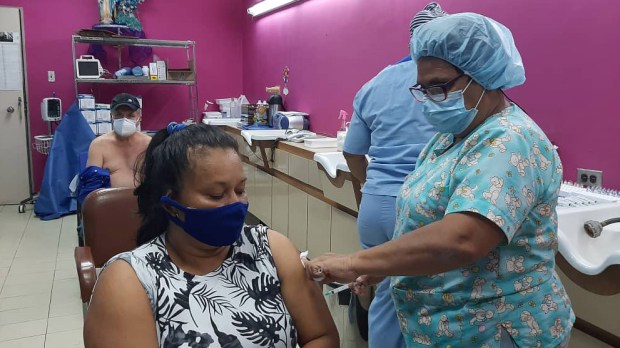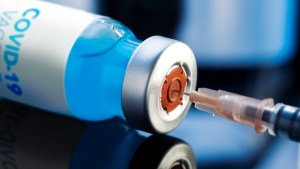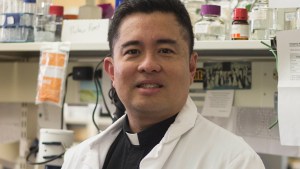A coalition of almost 40 Catholic organizations is calling for vaccine equity in the U.S. and around the world.
In a statement marking World Health Day, the coalition said it is “drawing on Catholic social teaching” to promote vaccine equity for people who are underserved or marginalized. “This includes communities of color, rural areas, and others with limited vaccine availability in the U.S., as well as access for developing countries and among refugees and other displaced people who may not be citizens in their current home,” said the April 7 statement.
Two days later, World Health Organization Director-General Tedros Adhanom Ghebreyesus said that over 87% of the world’s COVID-19 vaccine doses have gone to high income or upper middle-income countries, while low income countries have received just 0.2%.
That disparity is a “massive global problem,” said Bill O’Keefe, Executive Vice President for Mission and Mobilization of Catholic Relief Services.
“Billions of people are going to be at greater risk for serious illness and death from the coronavirus if inequities and delays in rolling out the vaccine persist,” O’Keefe said in an interview. In addition, “the longer the virus has a pool of unprotected people, to spread and mutate, the greater the risk that the pandemic will just keep going and going and that the virus will mutate itself around the vaccine.”
Mary Beth Powers, President and Chief Executive Officer of Catholic Medical Mission Board, said that CMMB is committed to the view that “this is a vaccine for all people and for human good, and that there needs to be a great deal of attention to vaccine equity globally.”
“None of us are safe until all of us are safe,” Powers said in an interview. “Pope Francis has made a number of statements about that, that we need to ensure that the poor, the vulnerable, healthcare workers are prioritized, but that the current ways of financing the vaccine and the production of the vaccine and the way it’s being purchased are not allowing for more equitable distribution globally.”
Reason for disparity
The reason for the disparity is multifaceted and can be seen in earlier health crises, such as SARS, said Brian M. Kane, Senior Director for Ethics for the Catholic Health Association.
“The wealthier countries try to buy up as many doses of a vaccine as they can for themselves,” Kane said in an interview. “When we look at the pharmaceutical industry worldwide, it operates on a for-profit basis. So there’s an inclination to play to the highest bidder. It then filters down to the poorer countries because of the charity of the wealthier countries, basically.”
Another issue is the challenges that vaccine storage and transportation present. Pfizer and Moderna are good examples of that, as those vaccines need to be kept at extremely cold temperatures. “The infrastructure to provide for that is really not found in a lot of third-world countries,” Kane said. “It’s compounded by the fact that when you have two doses, it’s a double problem.”
Vatican voices concern
The Vatican has been vocal about the need for equitable distribution of a vaccine. In December, the Vatican COVID-19 Commission and Pontifical Academy for Life reminded world leaders that “vaccines were developed as a public good and must be provided to all fairly and equitably, prioritizing those most in need.”
In February, the international Catholic charity organization Caritas Internationalis called on wealthy nations to remit the debt of the poorest countries and use the funds obtained to upgrade the medical and health systems in these countries.
In a statement signed by Cardinal Luis Antonio Tagle, President of Caritas, and Cardinal Peter Kodwo Appiah Turkson, Prefect of the Congregation for the Promotion of Integral Human Development, Caritas also advocated for the “local production of vaccines in different technical hubs in Africa, Latin America and Asia [to] make them available in the next six months by addressing the issue of patent and technical collaboration with the poorer nations.”
Other Catholic organizations such as CRS, CMMB and CHA also would like to see some kind of arrangement in which pharmaceutical companies share the technology behind their vaccines. One approach would be for the World Trade Organization to issue a waiver to international property laws in order to expand manufacturing capacity in third-world countries.
On Wednesday, Oxfam — the confederation of 20 independent charitable organizations focusing on the alleviation of global poverty — released a letter signed by more than 100 former heads of state and Nobel laureates calling on President Joseph R. Biden to waive intellectual property rules for coronavirus vaccines and “put the collective right to safety for all ahead of the commercial monopolies of the few,” according to the Washington Post:
While the letter spearheaded by Oxfam called on the United States to back a temporary waiver of World Trade Organization intellectual property rules, breaking vaccine monopolies, … experts [at Duke University] argued that such a measure is unnecessary and could prove chaotic.
Instead, they propose that the United States should back the use of cooperative licensing arrangements to increase manufacturing capacity, so that production can be scaled up quickly but safely.
O’Keefe hinted that the companies should be in a position to pay back in some way after benefitting from U.S. government aid.
“It’s a complicated issue, but a lot of the technology resulted from taxpayer funds investing in research and development,” he said, pointing out that federally funded Operation Warp Speed under former President Donald J. Trump “provided a lot of the money to develop the Moderna and Johnson & Johnson vaccines, as well as others not yet approved.”
Donating excess vaccine
According to O’Keefe, CRS, the U.S. Catholic bishops’ overseas aid agency, is advocating that the U.S. government donate more money to COVAX and to share more of its surplus doses. COVAX is an effort of the WHO and two other international organizations to accelerate the development and manufacture of COVID-19 vaccines, and to guarantee fair and equitable access for every country in the world.
“The U.S. and several other countries have purchased much more vaccine than they need for their population, so we’re simply saying ‘Donate the extra to countries who need it,’” O’Keefe said. “There’s no point in hoarding vaccine that is in excess of what you’ll need.”
On Friday, a report by the Duke Global Health Innovation Center said that the U.S. is on track to have gathered at least 300 million excess doses of coronavirus vaccine doses as soon as July, the Washington Post reported.
Biden has pledged to donate doses, after “making sure Americans are taken care of first,” he said.
On the ground
Meanwhile, Catholic agencies are laying groundwork for the hoped-for flow of more vaccines into the poorer areas of the world where they carry out humanitarian aid.
“CRS on the ground, in the countries where we’re operating, is already working with our Church partners, Catholic health infrastructure, and ministries of health to prepare for getting the vaccine,” O’Keefe said. “That involves fighting disinformation, which is a problem everywhere. We are educating community leaders about the vaccine and about its efficacy. And we are beginning to purchase protective supplies and help organize distributions in the remote places where CRS tends to operate.”
Said CMMB’s Mary Beth Powers, “The cost of the vaccine is only one small part of what it’s going to take to get shots in arms, so it’s very important that we along with other organizations are working to educate populations, to look at what it’s going to require to maintain a cold chain, to bring vaccines to rural areas where we work. We’re already working in partnership with governments on the ground, to prepare to deliver the vaccines, when it’s still a pretty big gap and we’re not sure if supplies are going to arrive or when they’re going to arrive in some countries.”



